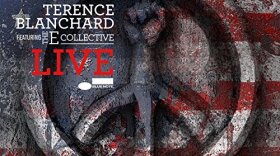Combine the mellifluous sound of guitarist Dave Stryker with the fluent and masterful horn playing of Steve Slagle and place them in a setting of original compositions (plus one Charles Mingus number) with a band that fits into the groove like a kid glove and you have one exceptional album. “Routes” is an exploration of some of the paths Stryker and Slagle have traveled over the years and draws the listener on like moth to the flame of innovative music.
Guitarist Dave Stryker and reedman Steve Slagle met in Harlem in the mid-1980s when Stryker was auditioning for organist Jack McDuff, of whose group Slagle was then a member. They have recorded together from time to time although it wasn't until 2003's “Stryker/Slagle Band” release that the two headed up a cooperative group. “Routes” is the sixth album from the band and offers an “expanded” context beyond a quartet. The focus is still upon the leader's playing with the larger group offering additional tonalities and rhythmic drive. It all works very well.
The opening number, “City of Angels”, immediately informs the listener there are exquisite sounds in store. A reference to Slagle's hometown, the composition presents an airy theme supported by the horns as Slagle's alto lays down a thoroughly captivating and soulful solo, followed by Stryker's warm guitar voice and Bill O'Connell's ebullient piano playing, all reflecting the positive energy abundant in this session.
With Billy Drewes' bass clarinet and O'Connell's Fender Rhodes, “Nothin' Wrong with It” evokes the sound of late 60s Miles – a bag that Stryker has visited on several of his SteepleChase albums in the past (“Shades of Miles” and “Shades Beyond”). Nothin' wrong with that, as the groove is entrancing and the music substantive. Slagle follows Drewes with a soaring soprano solo that opens the path for Stryker's that goes from slow burn to seething intensity.
The Charles Mingus number “Self-Portrait in Three Colors” has Slagle, a Mingus Big Band member and arranger, in a reflective mood playing pretty as you please. His music is always going someplace with choice notes and precision runs that draw the listener inside his sound. A restrained solo from Stryker and bassist Gerald Cannon wrap this lovely non-original in the program.
The title track sets in the laid-back swinger pocket that showcases the guitarist's impressive chops which continue to amaze as we are certainly listening to one of the preeminent voices on the instrument who can do just about anything with ease - a natural soul and technical expertise that are listening delights. His Wes Montgomery influenced chords lead the way for Slagle, whose alto sound floats with melodic twists and turns. O'Connell pounces forth with an enthusiastic solo and bassist Cannon has some licks before the leaders close this exhilarating number.
Slagle's “Ft. Greene Scene” is a reference to Brooklyn where he and Stryker have lived. It strikes a multicultural groove that cooks with a Latin beat that won't stop. O'Connell delivers the tasty Rhodes piano support for the altoist and guitarist and all three step in with solos that effortlessly sail across the beat with a buoyant tinge.
Stryker's “Great Plains” is a pensive number evoking his midwestern roots and finely embellished by Clark Gayton's trombone and Slagle's attractive flute and alto playing.Extensity” unleashes the band and particularly drummer McClenty Hunter who rocks the music with a thrusting, boiling sound propelling the two leaders before he gets a well-deserved solo spot.
“Gardena” has an inviting come-hither feel; it's beat moving up a step as the horns state the theme and O'Connell enters for a marvelous solo. Latin rhythms are so much a part of O'Connell's style that his playing repeatedly lends an upbeat influence to the band. Slagle and Stryker ride the rhythmic waves of this lovely line that evolves into a soulful bossa.
Stryker's bluesy cooker “Lickety Split Lounge” has reference to the place where he and Slagle first met and played together while Stryker was auditioning for Jack McDuff's band up in Harlem. It drips soul as prevailed with the legendary organist's music and provides swinging framework for the leaders' thrilling solos. Gayton is back for a round at the bone and O'Connell delivers another lively turn on piano before the curtain comes down on this most satisfying recording.
The album's attractive packaging deserves special mention. In this age of MP3s and like subordination of the senses to expedience, it is especially nice to enjoy an aesthetically pleasing presentation - an enduring piece of art, if you will. The cover reproduces a vivid painting by bassist Gerald Cannon. The album booklet is attractively laid out in appealing colors, with informative biographical and track information and photos of band members – a credit to graphic design from Christopher Drukker. And, of course, there is fine music inside.
The Stryker/Slagle Band's new release is a welcome addition to the group's discography. The musicianship is so solid that “Routes” invites repeated listening in attempt to absorb all of the alluring nuances. It's an eminently rewarding album that leaves the listener yearning for more.
Personnel: Dave Stryker – guitar; Steve Slagle – alto and soprano sax; flute; John Clark – french horn; Billy Drewes – tenor sax and bass clarinet; Clark Gayton – trombone and tuba; Bill O’Connell – piano and Fender Rhodes; Gerald Cannon – bass; McClenty Hunter – drums
Tracks: City of Angels; Nothin’ Wrong With It; Self-Portrait in Three Colors; Routes; Ft. Greene Scene; Great Plains; Extensity; Gardena; Lickety Split Lounge





